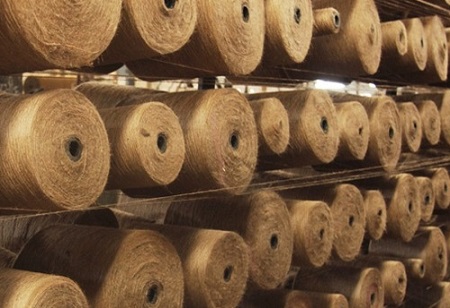In a bid to create a global demand for jute products made in India, the Indian Jute Mills Association (IJMA) has launched an e-market place. Compared to products made in Bangladesh, Indian jute products have low market demand at present. The domestic industry is surviving on the government orders of sacks, which is mainly governed by the Jute Packaging Material Act -1987. Without this Act the jute industry would have ceased to exist, an IJMA official said, adding that there is a need to transform the demand from that of government orders to market driven orders and hence IJMA has created this integrated e-commerce platform.
Although there are 92 jute mills and more than 5 lakh jute product manufacturers across the country, IJMA initiative has just roped in 3 jute mills and 200 manufacturers into its platform. “We seek to have all the jute mills and jute product manufacturers under this platform,” IJMA chairman Raghavendra Gupta said.
IJMA has roped in a lean management consultant, who is working closely with the ministry of textiles to convert the government dependent jute industry to a market driven industry.
According to Debashish Roy, Director General, IJMA, since most jute product manufacturers are in the small or micro category, most of them have very limited market access.
In India a ban has already been imposed on single use plastic, which has opened up new possibilities for jute packaging, though paper packaging is poised to give a stiff competition to it. The jute mill owners have already urged the Centre to make use of jute bags mandatory in all malls and departmental stores. Although this would cost higher than plastic or paper packaging, it will give better return at a later stage.
According to Hemant Bangur, chairman of Glaster, in Europe people initially spend a little money in buying RFID tagged jute bags but at a later stage it fetches returns by way of protecting environmental and health hazards. This can be implemented in India, if use of jute bags is made mandatory in departmental stores and malls. However, Debabrata Choudhury, an industry expert, expressed doubt over the success of the e-market place because sourcing jute fabric would pose a major problem. Most jute mill owners use 80% of their capacity in manufacturing jute sacks and the rest 20% is utilized for manufacturing other products. The limited share of market, which India has for jute products overseas, is mostly enjoyed by the 67 jute mills of West Bengal and so they would all likely thwart on the entry of other players.
The textile ministry has taken keen interest on development of the e-market place and have expressed willingness to extend financial support to this initiative once it crystallizes, an IJMA official said. (Financial Express)
 Magazine
Magazine
